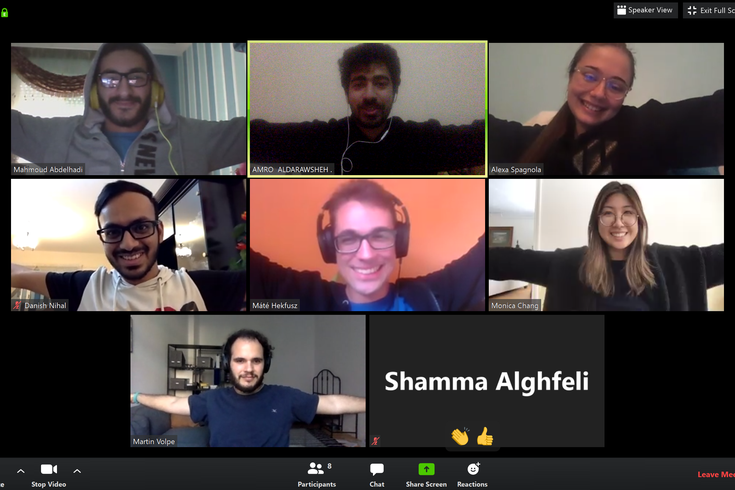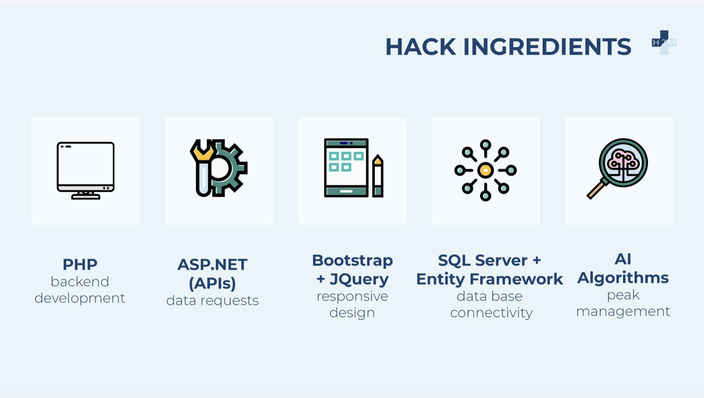
May 01, 2020
 Courtesy/Alex Spagnola
Courtesy/Alex Spagnola
Hero Health Match is a medical staffing marketplace designed to meet hospital demand for health care workers during local COVID-19 surges. It was developed by a seven-person team at the 2020 Annual NYUAD International Hackathon for Social Good in the Arab World.
A junior at the University of Pennsylvania is part of a global team developing a promising platform to help hospitals fill staffing shortages during the coronavirus pandemic.
Alexa Spagnola, an electrical engineer and entrepreneurship student, participated in the 2020 NYUAD Hackathon for Social Good in the Arab World. The annual event typically takes place in Abu Dhabi, but the emergence of the pandemic forced the competition to be held virtually this year.
To address the COVID-19 crisis, all hackathon teams were tasked with creating tech solutions to improve the way communities and industries respond to the pandemic's challenges.
Health Hero Match, the platform developed by Spagnola's seven-member team, took home the top prize.
Also referred to as H2M, the app is a two-sided marketplace configured on principles similar to those used by apps such as Uber and Airbnb. It utilizes a combination of real-time modeling and artificial intelligence to connect medical workers with hospitals in areas facing surges of COVID-19.
"We are targeting doctors, nurses and medical students who are close to finishing their studies," Spagnola said. "The entire project was driven by the fact that we saw a lot of these people already wanting to pick up and go to areas where they're needed. We thought we should facilitate this and make it easier on them."
The platform offers a competitive market for nurses who are out of work or in private practice and doctors who are retired or located in areas that aren't facing peak cases.
Medical workers will be able to upload their credentials and salary requirements onto the app, filtering by location and personal qualifications. Once an initial match is made on the marketplace, an application can be submitted and an independent negotiation and background check can take place between the medical worker and the hospital.
The current iteration of H2M uses models based on real-time COVID-19 statistics from the U.S. Center for Disease Control and Prevention's standard public model API. Artificial intelligence then helps predict the demand for medical workers in each city and projects the patient load faced by hospitals.
"The hospital administrator, when they log on to their side of the platform, can request however many people they need," Spagnola said. "We also advise hospitals of that number based on the model."
Doctors and nurses who accept positions through H2M generally will be looking at temporary work for the duration of the COVID-19 peak. The incentive to temporarily relocate may be influenced by factors such as crisis pay. Others may find opportunities in cities where they already reside.
H2M will provide access to resources, such as free or favorable hotel accommodations, that health care workers need in order to accept on an offer. The platform eventually aims to foster relationships between hospitals and hotels that can be wrapped into the process of onboarding medical workers.
Developed over a three-day span from April 16-19, H2M is now piloting locally in Abu Dhabi. The goal is to provide a proof of concept to other hospitals. Once success is replicated, Spagnola believes the platform can expand at an exponential rate.
"I think something that's unique about what we built is that since it's completely web-based, there is no physical product," Spagnola said. "There isn't going be a lot of cost or overhead affiliated with what we're building, which allows us to move really quickly and scale in a really rapid way."
"It's very much dependent on the timeline of this virus, in terms of when a vaccine or a viable treatment is available," Spagnola said. "What do governments choose to do? Local governments lifting stay-at-home orders may lead to secondary peaks."
In the future, Spagnola and her team hope to incorporate data from within cities to determine which hospitals have the greatest needs and where socioeconomic factors may intensify demand.
The platform is proprietary to Spagnola's team and could be developed into a full-fledged company with future application beyond the COVID-19 crisis.
"Pandemics have been proven to be more prevalent moving forward given the world that we live in. At any moment, outbreaks are possible," Spagnola said. "Having something set up for load management before that happens, instead of having to build something in a reactionary way, is possible. This was built out of circumstances, so we'll continue to move with the circumstances."
Spagnola, whose primary skill set is in hardware, previously has interned for Google and now has a summer internship lined up with U.S. Department of Defense. Her experience includes projects in environmental engineering and aerospace. She expected to use her hardware skills for the hackathon in Abu Dhabi, but the change of plans refocused her role to project management, market research, strategy and user experience and design.
Down the line, Spagnola hopes to see H2M scale into a company whose platform can be monetized. For now, she and her team members simply want to see their project make a difference.
"We're engineers. The best way that we know to help others is to build something that solves a problem," Spagnola said. "We really thought medical staff was a population in dire need of someone to come along and solve their problems, because they're taking it upon themselves to solve all of our problems."
 Source/Contributed Photo
Source/Contributed Photo